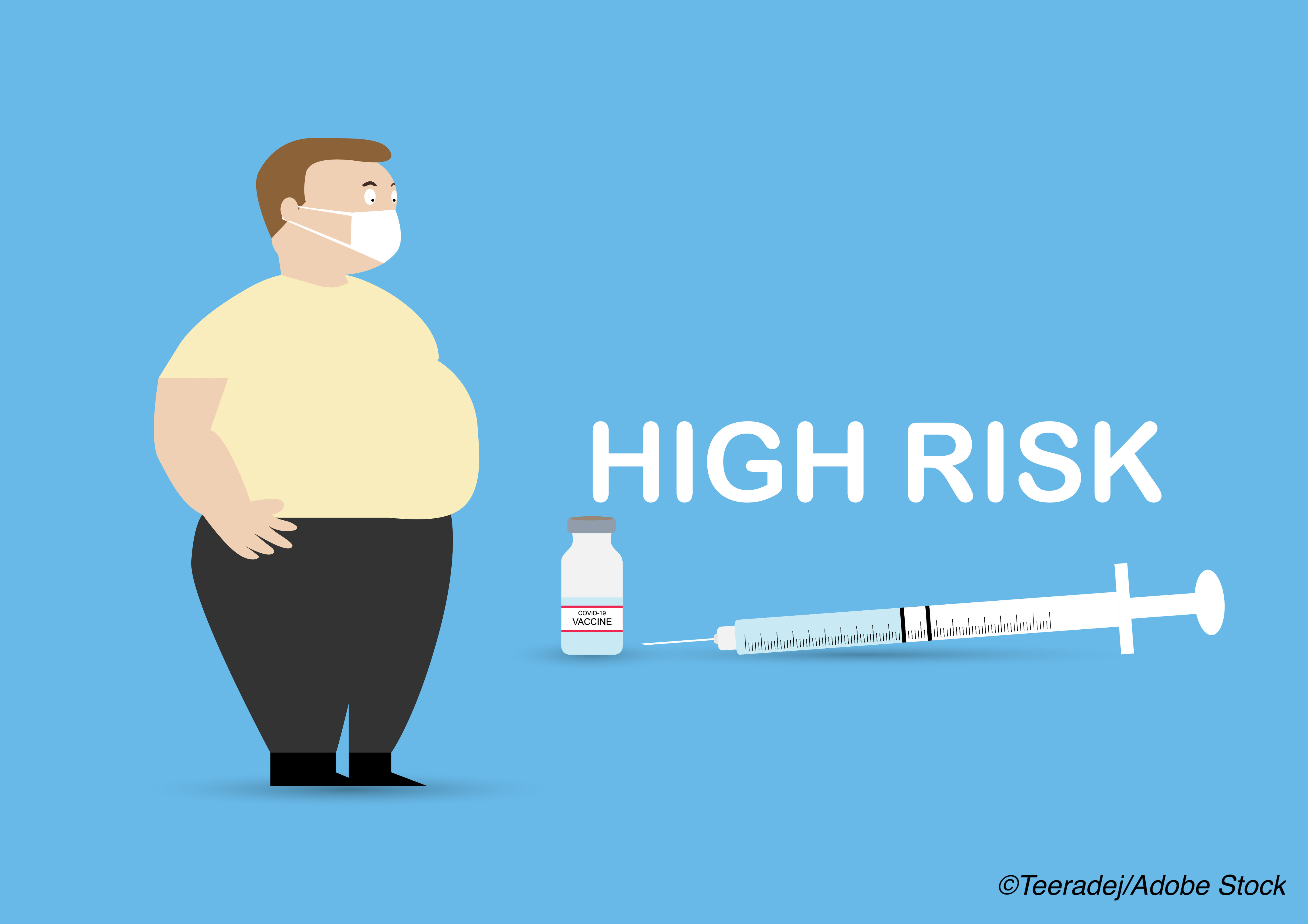
Among people with a body mass index (BMI) over 23 kg/m2, greater weight was linearly associated with increased risk for severe Covid-19 in a prospective, community-based cohort study with close to 7 million people from the United Kingdom.
Researchers reported that the hazard ratios for hospital admission, admission to the ICU, and death from Covid-19 increased progressively with increasing body weight among overweight (>23 kg/m2) and obese people, and that this increase in risk was independent of risk associated with obesity-related diseases such as type 2 diabetes.
The association between increasing BMI and severe Covid-19 risk was greatest among younger adults (<40 years) and Black patients.
“We found J-shaped associations between increasing BMI and hospital admission or death due to Covid-19, with increased risks for people with a BMI of 20 kg/m2 or less and approximately linear increases in risk for people with a BMI of more than 23 kg/m2 for admission to hospital, but the risk of death increased only in people with a BMI of more than 28 kg/m2,” wrote researcher Carmen Piernas, PhD, of the University of Oxford, and colleagues, in the journal Lancet Diabetes & Endocrinology.
The researchers noted that while multiple previous studies and several systematic reviews and meta-analyses have identified obesity as a clinically significant risk factor for developing severe Covid-19, “this association might occur due to a special form of collider bias, termed index event bias.”
“Almost all studies of this potential association to date have examined outcomes of patients admitted to hospital and compared progression to ICU or death between those with and without obesity,” they wrote. “Because either obesity itself or the severity of Covid-19 disease could prompt admission to hospital, the association between these factors might be spurious.”
They noted that a previously published population-based study from the U.K., which avoided the risk of collider bias, found having a BMI of 30 kg/m2 or higher to be associated with a slightly increased risk of death from Covid-19.
“However, this study did not examine the risk of unit increases in BMI across the population, of which a large proportion have a BMI lower than 30 kg/m2,” Piernas and colleagues wrote.
The researchers conducted their population-based study to explore whether excess weight independent of obesity is associated with greater Covid-19 risk.
They examined data between Jan. 20 and April 20, 2020 involving patients age 20 years and older registered in the QResearch database, which includes health records from over 35 million patients in the U.K.
Extracted data included demographic, clinical, clinical values linked with Public Health England’s database of positive SARS-CoV-2 test results, and death certificates. Outcomes, as a proxy measure of severe Covid-19, were admission to hospital, admission to an ICU, and death due to Covid-19.
Cox proportional hazard models were used to estimate the risk of severe Covid-19, sequentially adjusted for demographic characteristics, behavioral factors, and comorbidities.
Among 6,910,695 eligible individuals (mean BMI 26.78 kg/m² [SD 5.59]), 13,503 (0.20%) were admitted to hospital, 1,601 (0.02%) to an ICU, and 5,479 (0.08%) died after a positive test for SARS-CoV-2.
The analysis revealed:
- J-shaped associations were identified between BMI and admission to hospital due to Covid-19—adjusted hazard ratio [HR] per kg/m² from the nadir at BMI of 23 kg/m² of 1.05 (95% CI 1.05-1.05) and death (HR, 1.04; 95% CI, 1.04-1.05), and a linear association was seen across the whole BMI range with ICU admission (HR, 1.10; 95% CI, 1.09-1.10).
- Significant interaction between BMI and age was identified, with higher hazard ratio per kg/m² above BMI 23 kg/m² for younger people—adjusted HR per kg/m² above BMI 23 kg/m² for hospital admission 1.09 (95% CI, 1.08-1.10) in 20-39 years age group versus 80-100 years group (HR, 1.01; 95% CI, 1.00–1.02).
- Significant interaction between BMI and ethnicity was also identified with Black patients having a higher risk than White patients (HR, 1.07; 95% CI, 1.06-1.08 versus 1.04; 95% CI, 1.04-1.05).
- Hospitalization risk and ICU admission due to Covid-19 associated with unit increase in BMI was slightly lower in people with type 2 diabetes, hypertension, and cardiovascular disease than in those without these morbidities.
In related commentary, Krishnan Bhaskaran, MSc, PhD, of the London School of Hygiene & Tropical Medicine, noted that the identification of an increased risk of hospital admission and death at the lowest BMI level was a novel finding.
Bhaskaran cited the lack of data on people with BMIs lower than 23 kg/m2 as a study limitation given that underweight is common among elderly populations.
“Key future research priorities will be to establish whether BMI affects vaccine efficacy, and to understand whether people outside the BMI range considered to be healthy (18.5-24.9 kg/m2) are at increased risk of post-Covid-19 sequelae,” Bhaskaran wrote. “Further careful epidemiological study of these and other emerging questions will inform the ongoing public health response to this new disease that is likely here to stay.”
-
Increasing weight was linearly associated with increased risk for severe Covid-19 in a prospective, community-based cohort study with close to 7 million people from the United Kingdom.
-
J-shaped associations between increasing BMI and hospital admission or death due to Covid-19 were identified in the study.
Salynn Boyles, Contributing Writer, BreakingMED™
This study was funded by the National Institute for Health Research Oxford Biomedical Research Centre. Susan Jebb and several other re-searchers reported being investigators on a trial of total diet replacement for weight loss funded by a grant from Cambridge Weight Plan U.K. Krihnan Bhaskaran declared no relevant competing interests.
Cat ID: 190
Topic ID: 79,190,730,933,795,190,926,252,51,518,927,925,934


